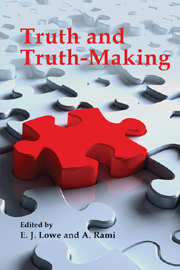Book contents
- Frontmatter
- Contents
- Preface
- Contributors
- 1 Introduction: truth and truth-making
- Part I Setting the stage
- Part II The current debate
- 8 Truth-making and correspondence
- 9 Facts and relations: the matter of ontology and of truth-making
- 10 Being and truth
- 11 An essentialist approach to truth-making
- 12 Are there irreducibly relational facts?
- 13 Why truth-makers
- 14 Postscript to “Why truth-makers”
- Bibliography
- Index
11 - An essentialist approach to truth-making
from Part II - The current debate
- Frontmatter
- Contents
- Preface
- Contributors
- 1 Introduction: truth and truth-making
- Part I Setting the stage
- Part II The current debate
- 8 Truth-making and correspondence
- 9 Facts and relations: the matter of ontology and of truth-making
- 10 Being and truth
- 11 An essentialist approach to truth-making
- 12 Are there irreducibly relational facts?
- 13 Why truth-makers
- 14 Postscript to “Why truth-makers”
- Bibliography
- Index
Summary
Definitions of the truth-making relation that appeal to the notion of metaphysical necessity are notoriously prone to problems, because they seem to be incapable of discriminating sufficiently finely between the truth-makers of different propositions, thus threatening to undermine or trivialize the very notion of a “truth-maker”. In this chapter, another approach is developed that appeals instead to a primitive notion of essence and explicates the truth-making relation in terms of a relationship of essential dependence between a proposition and its truth-maker(s). An advantage of this approach is that it draws on a theory of essence that is, very arguably, needed in any case in order to provide a satisfactory general account of modal truth and modal knowledge. As such, it is arguably superior to an account of truth-making that appeals merely to the unanalysed notion of a true proposition's being true “in virtue of” its truth-maker(s).
The idea that all truths need to be made true is an appealing one. This is so whatever one may think the “primary” truth-bearers to be: sentences, statements, beliefs or propositions. To avoid undue complexity, I shall assume that propositions are the primary truth-bearers in what follows, but I do not think that this assumption is crucial to the general thrust of the arguments that I shall be advancing.
So, why should I say that it is an appealing idea that all true propositions need to be made true? Well, there is plainly a difference between a proposition’s being true and that same proposition’s being false, and this is a difference that we obviously want to be able to explain. It does not follow immediately that this difference is a difference between a proposition’s possessing one property, the property of being true, and its possessing another property, the property of being false.
- Type
- Chapter
- Information
- Truth and Truth-Making , pp. 201 - 216Publisher: Acumen PublishingPrint publication year: 2008



